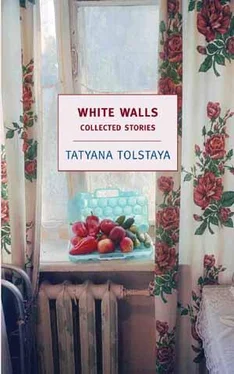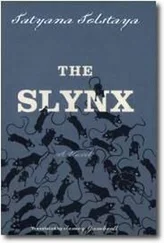Now, that was luck. That happens once every hundred years. Because the only available naked man—in the anatomy textbook—isn’t real. Having torn off his skin for the occasion, brazen, meaty, and red, he shows off his clavicular-sternum-nipple muscles (all dirty words!) to the students of the eighth grade. When we’re promoted (in a hundred years) to the eighth grade, he’ll show us all that too.
The old woman, Anna Ilyinichna, feeds her tabby cat, Memeka, with red meat like that. Memeka was born after the war and she has no respect for food. Digging her four paws into the pine tree trunk, high above the ground, Memeka is frozen in immobile despair.
“Memeka, meat, meat!”
The old woman shakes the dish of steaks, lifts it higher for the cat to see better.
“Just look at that meat!”
The cat and the old woman regard each other drearily. “Take it away,” thinks Memeka.
“Meat, Memeka.”
In the suffocating undergrowths of Persian red lilac, the cat mauls sparrows. We found a sparrow like that. Someone had scalped its toy head. A naked fragile skull like a gooseberry. A martyred sparrow face. We made it a cap of lace scraps, made it a white shroud, and buried it in a chocolate box. Life is eternal. Only birds die.
Four carefree dachas stood without fences—go wherever you want. The fifth was a privately owned house. The black log framework spread sideways from beneath the damp overhang of maples and larches and growing brighter, multiplying its windows, thinning out into sun porches, pushing aside nasturtiums, jostling lilacs, avoiding hundred-year-old firs, it ran out laughing onto the southern side and sopped above the smooth strawberry-dahlia slope down-down-down where warm air trembles and the sun breaks up on the open glass lids of magical boxes filled with cucumber babies inside rosettes of orange flowers.
By the house (and what was inside?), having flung open all the windows of the July-pierced veranda, Veronika Vikentievna, a huge white beauty, weighs strawberries: for jam and for sale to neighbors. Luxurious, golden, applelike beauty! White hens cluck at her heavy feet, turkey-cocks stick their indecent faces out of the burdock, a red-and-green rooster cocks his head and looks at us: what do you want, girls? “We’d like some strawberries.” The beautiful merchant’s wife’s fingers in berry blood. Burdock, scales, basket.
Tsaritsa! The greediest woman in the world:
They pour foreign wines for her,
She eats iced gingerbread,
Terrifying guards surround her….
Once she came out of the dark shed with red hands like that, smiling. “I killed a calf…”
Axes over their shoulders….
Aargh! Let’s get out of here, run, it’s horrible—an icy horror —shed, damp, death….
And Uncle Pasha is the husband of this scary woman. Uncle Pasha is small, meek, henpecked. An old man: he’s fifty. He works as an accountant in Leningrad; he gets up at five in the morning and runs over hill and dale to make the commuter train. Seven kilometers at a run, ninety minutes on the train, ten minutes on the trolley, then put on black cuff protectors and sit down on a hard yellow chair. Oilcloth-covered doors, a smoky half-basement, weak light, safes, overhead costs—that’s Uncle Pasha’s job. And when the cheerful light blue day has rushed past, its noise done, Uncle Pasha climbs out of the basement and runs back: the postwar clatter of trolleys, the smoky rush-hour station, coal smells, fences, beggars, baskets; the wind chases crumpled paper along the emptied platform. Wearing sandals in summer and patched felt boots in winter, Uncle Pasha hurries to his Garden, his Paradise, where evening peace comes from the lake, to the House where the huge, golden-haired Tsaritsa lies waiting on a bed with four glass legs. But we didn’t see the glass legs until later. Veronika Vikentievna had been feuding a long time with Mother.
The thing was that one summer she sold Mother an egg. There was an ironclad condition: the egg had to be boiled and eaten immediately. But lighthearted Mother gave the egg to the dacha’s owner. The crime was revealed. The consequences could have been monstrous: the landlady could have let her hen sit on the egg, and in its chicken ignorance it could have incubated a copy of the unique breed of chicken that ran in Veronika Vikentievna’s yard. It’s a good thing nothing happened. The egg was eaten. But Veronika Vikentievna could not forgive Mother’s treachery. She stopped selling us strawberries and milk, and Uncle Pasha smiled guiltily as he ran past. The neighbors shut themselves in; they reinforced the wire fence on metal posts, sprinkled broken glass in strategic points, stretched barbed wire, and got a scary yellow dog. Of course, that wasn’t enough.
After all, couldn’t Mother still climb over the fence in the dead of night, kill the dog, crawl over the glass, her stomach shredded by barbed wire and bleeding, and with weakening hands steal a runner from the rare variety of strawberries in order to graft it onto her puny ones? After all, couldn’t she still run to the fence with her booty and with her last ounce of strength, groaning and gasping, toss the strawberry runner to Father hiding in the bushes, his round eyeglasses glinting in the moonlight?
From May to September, Veronika Vikentievna, who suffered from insomnia, came out into the garden at night, stood in her long white nightgown holding a pitchfork like Neptune, listening to the nocturnal birds, breathing jasmine. Of late her hearing had grown more acute: Veronika Vikentievna could hear Mother and Father three hundred yards away in our dacha, with the camel’s hair blanket over their heads, plotting in a whisper to get Veronika Vikentievna: they would dig a tunnel to the greenhouse with her early parsley.
The night moved on, and the house loomed black behind her. Somewhere in the dark warmth, deep in the house, lost in the bowels on their connubial bed, little Uncle Pasha lay still as a mouse. High above his head swam the oak ceiling, and even higher swam the garrets, trunks of expensive black coats sleeping in mothballs, even higher the attic with pitchforks, clumps of hay, and old magazines, and even higher the roof, the chimney, the weather vane, the moon—across the garden, through dreams, they swam, swaying, carrying Uncle Pasha into the land of lost youth, the land of hopes come true, and the chilled Veronika Vikentievna, white and heavy, would return, stepping on his small warm feet.
Hey, wake up, Uncle Pasha! Veronika is going to die soon.
You will wander around the empty house, not a thought in your head, and then you will straighten, blossom, look around, remember, push away memories and desire, and bring—to help with the housekeeping—Veronika’s younger sister, Margarita, just as pale, large, and beautiful. And in June she’ll be laughing in the bright window, bending over the rain barrel, passing among the maples on the sunny lake.
Oh, in our declining years….
But we didn’t even notice, we forgot Veronika, we had spent a winter, a whole winter, a winter of mumps and measles, flooding and warts and a Christmas tree blazing with tangerines, and they made a fur coat for me, and a lady in the yard touched it and said: “Mouton.”
In the winter the yardmen glued golden stars onto the black sky, sprinkled ground diamonds into the connecting courtyards of the Petrograd side of town, and, clambering up the frosty air ladders to our windows, prepared morning surprises: with fine brushes they painted the silver tails of firebirds.
And when everyone got sick of winter, they took it out of town in trucks, shoving the skinny snowbanks into underground passages protected by gratings, and smeared perfumed mush with yellow seedlings around the parks. And for several days the city was pink, stone, and noisy.
Читать дальше












